- Home
- Elizabeth E. Wein
Code Name Verity Page 7
Code Name Verity Read online
Page 7
‘You might have brought your brolly,’ Queenie said.
‘I’m saving it for the next air raid.’
They came to a crossroads. There were no road signs, not one; they’d all been taken down or blacked over to confuse the enemy in the event Operation Sea Lion was successful and the German army came swarming inland. ‘I’ve no idea where we are,’ Queenie wailed. The mechanic’s bike was so big for her that she couldn’t sit down on it; she had to stand on the pedals. She seemed in perpetual danger of falling off, or of being devoured by her enormous overcoat. She had the outraged, distraught look of a wet cat.
‘Use the compass. Keep going east till you find the sea. Pretend,’ Maddie told her, inspired – ‘Pretend you’re a German spy. You’ve been dropped here by parachute. You’ve got to find your contact, who’s at this legendary smugglers’ pub by the sea, and if anyone catches you –’
Under her dripping plastic rain hat, the kind you get in a tiny cardboard box with a flower on it for a halfpenny, Queenie gave Maddie a strange look. It had challenge in it, and defiance, and excitement. But also enlightenment. Queenie leaned forward over the handlebars of her bicycle and was off, pedalling like fury.
At the crest of a low rise she bounded off her bike in one almighty leap like a roe deer away up the glens, and was halfway up a tree before Maddie realised what she was doing.
‘Get down, you daft idiot! You’ll be soaked! You’re in uniform!’
‘Von hier aus kann ich das Meer sehen,’ said Queenie, which is ‘I can see the sea from here’ in German. (Oh – silly me. Of course it is.)
‘Shut up! You lunatic!’ Maddie scolded furiously. ‘What are you doing?’
‘Ich bin eine Agentin der Nazis.’ Queenie pointed. ‘Zum Meer geht es da lang.’
‘You’ll get us both shot!’
Queenie considered. She looked at the teeming sky, looked at the endless dripping apple orchard and looked at the empty road. Then she shrugged and said in English, ‘Don’t think so.’
‘“Careless talk costs lives,”’ Maddie quoted.
Queenie laughed so hard she slid gracelessly and painfully from one branch to a lower branch, and tore her coat climbing down. ‘Now just you be quiet, Maddie Brodatt. You told me to be a Nazi spy and I’m being one. I won’t let you get shot.’
(I really would like to catapult myself back there in time and kick my own teeth in.)
The outbound route to St Catherine’s Bay was, shall we say, creative. It involved Queenie getting off her bicycle at every single crossroads – each one wet, windy and featureless – and climbing a wall or gate or tree to get her bearings. Then there was always a palaver with the greatcoat as she got going again, and near misses with puddles.
‘You know what I’m scared of ?’ Maddie yelled at the top of her voice, rain and east wind beating in her face as she pedalled energetically to keep up with the small wireless operator. ‘Cold tinned beans! It’s quarter to two. The pub’ll be shut by the time we get there.’
‘You said it doesn’t shut till next week.’
‘For the afternoon, you gormless halfwit! They stop serving till evening!’
‘I think that’s frightfully unfair of you, blaming it on me,’ Queenie said. ‘It’s your game. I’m just playing along.’
‘Another thing I’m scared of,’ Maddie said.
‘That doesn’t count. Neither do the tinned beans. What are you most afraid of – what’s your number one fear?’
‘Court martial,’ answered Maddie briefly.
Queenie, uncharacteristically, was silent. And stayed silent for some time, even while she did another of her tree-climbing surveys of the surrounding area. Finally she asked, ‘Why?’
It had been a good long while since Maddie had given her answer, but Queenie did not need to remind her what the subject had been.
‘I keep doing things. I make decisions without thinking. Crikey, firing a ruddy anti-aircraft gun – no authorisation whatsoever, and Messerschmitt 109s circling overhead!’
‘The Messerschmitt 109s circling overhead were the reason you were firing it,’ Queenie pointed out. ‘I authorised you. I’m a Flight Officer.’
‘You’re not my Flight Officer and you don’t have any gunnery authority.’
‘What else?’ Queenie asked.
‘Oh – things like guiding in the German pilot the other day. I’ve done something like that before, only in English.’ She told Queenie about talking down the lads in the Wellington, the first time. ‘No one authorised that either. I didn’t get in trouble, but I should have. So stupid. Why did I do it?’
‘Charity?’
‘I could have killed them though.’
‘You have to take risks like that. There’s a war on. They could have bought it and gone down in flames themselves, without your help. But with your help they made it down safely.’
Queenie paused. Then she asked, ‘Why are you so damn good at it?’
‘At what?’
‘Air navigation.’
‘I’m a pilot,’ Maddie said – you know, she was so matter-of-fact, she wasn’t proud, she wasn’t defensive – just, I’m a pilot.
Queenie was outraged.
‘You said you didn’t have any skills, you fibber!’
‘I haven’t. I’m only a civil pilot. I haven’t flown for a year. I haven’t got an instructor’s rating. I’ve a good many hours, probably more than most of our lads in the Spitfires; I’ve even flown at night. But I’m not using it. When they expand the Air Transport Auxiliary, I’m going to try to join – if the WAAF’ll let me go. I’ll have to do a course. There’s no flight training on for women at the minute.’
Queenie apparently had to turn all this over in her head on her own for a while as she considered the implications of it: Maddie Brodatt, with her unrefined South Manchester accent and her no-nonsense bike mechanic’s approach to problems, was a pilot – with more practical experience than most of the young RAF Maidsend Squadron who were daily and sleeplessly hurling themselves towards flame and death against the Luftwaffe.
‘You’re dead quiet,’ Maddie said.
‘Ich habe einen Platten,’ Queenie announced.
‘Speak English, you lunatic!’
Queenie stopped her bike and climbed off. ‘I have a puncture. My tyre’s flat.’
Maddie sighed heavily. She propped her own bicycle against the verge and squatted in a puddle to look. Queenie’s front tyre was nearly completely flat. The puncture must have happened only seconds before – Maddie could still hear the air hissing out of the inner tube.
‘We’d better go back,’ she said. ‘If we go on we’ll have too far to walk. I don’t have a repair kit.’
‘O faithless one,’ Queenie said, pointing to the entrance to a farm lane about twenty yards further on. ‘This is my plan to scrounge a meal before I meet my contact.’ She sniffed knowingly, nose raised into the wind. ‘A provincial farmhouse lies less than a hundred yards away, and I smell meat stew and fruit pie –’ She took her wounded bicycle by the handlebars and set off up the lane at a determined pace. Land Army girls were hoeing among the cabbages in the adjoining field – no time off for them in the rain either. They had sacks tied round their legs with string and ground sheets with holes in the middle for rain capes. Maddie and the disguised Nazi spy were well-equipped by comparison in their RAF men’s overcoats.
A chorus of vicious dogs began to bark as they approached. Maddie looked round anxiously.
‘Don’t worry, that’s just noise. They’ll be tied up or they’d bother the Land Girls. Is the sign up?’
‘What sign?’
‘A jar of rowan berries in the window – if there’s no rowan in the window I won’t be welcome.’
Maddie burst out laughing.
‘You are daft!’
‘Is there?’
Maddie was taller than her companion. She stood on tiptoe to see over the barnyard wall, and her mouth dropped open.
‘There is,’ she s
aid, and turned to gape at Queenie. ‘How –?’
Queenie leaned her bicycle against the wall, looking very smug. ‘You can see the trees over the garden wall. They’ve just been trimmed. It’s all very tidy and pretty in a wifely way, but she’ll have dug up her geraniums to plant tatties for the War Effort. So if she has something nice to decorate her kitchen with, like fresh-cut rowan berries, she’s likely to do it, and –’
Queenie settled her hair into shape beneath the plastic rain bonnet. ‘And she’s the sort of person who will feed us.’
She let herself in boldly at the kitchen door of the strange farm.
‘Ah’ve nae wish tae disturb ye, Missus –’ Her well-bred, educated accent suddenly developed an irresistible Scottish burr. ‘We’ve come frae RAF Maidsend and Ah’ve had this wee spot o’ bother wi’ me bike. Ah wondered –’
‘Oh, no trouble at all, love!’ the farmer’s wife said. ‘I’ve a couple of Land Girls boarding with me, and I’m sure we’ve got a puncture repair kit among us. Mavis and Grace’ll be in the fields just now, but if you wait a moment I’ll check the shed – Oh, and for goodness sake come in and warm yourselves first!’
Queenie produced, as if by magic, a tin of 25 Player’s from deep in the pockets of her greatcoat. Maddie realised suddenly that this infinite supply of cigarettes was carefully hoarded – realised that she’d scarcely ever seen Queenie smoking, but that she used cigarettes as gifts or as payment in kind in place of cash – for tips and poker chips and, now, bicycle patches and lunch.
Only once, Maddie remembered now, had she seen Queenie smoking a cigarette she hadn’t lit for someone else – only once, when she’d been waiting to interview the German pilot.
Queenie held out the cigarettes.
‘Oh, goodness no, that’s far too much!’
‘Aye, take them, let your lassies share ’em out. A gift o’ thanks. But would ye no gie us a loan o’ your hob to heat our wee tin o’ beans before we go?’
The farmer’s wife laughed merrily. ‘They making WAAF officers take to the roads like gypsies, are they, buying a boil of your tea can in exchange for a smoke? There’s shepherd’s pie and apple crumble left over from our own dinner, you can help yourselves to that! Just a minute while I find you a patch for your tube –’
They were soon tucking into a steaming hot meal considerably better than any they’d eaten at Maidsend for the past three months, including new cream to pour over the home baking. The only inconvenience was that they had to eat it standing up as there was so much traffic through the kitchen – the chairs had been removed so as not to clutter up the passage of farmhands and Land Army girls and dogs (no children; they’d been evacuated, away from the front line of the Battle of Britain).
‘You owe me four more fears,’ Queenie said.
Maddie thought. She thought about most of the fears that Queenie had confessed to – ghosts, dark, getting smacked for naughtiness, the college porter. They were almost childish fears, easily bottled. You could knock them on the head or laugh at them or ignore them.
‘Dogs,’ she said abruptly, remembering the slavering hounds on the way in. ‘And Not Getting the Uniform Right – my hair’s always too long, you’re not allowed to alter the coat so it’s always too big, things like that. And: Southerners laughing at my accent.’
‘Och aye,’ Queenie agreed. It could not be a problem she ever encountered, with her educated, upper-crust vowels, but being a Scot she sympathised with any distrust of the soft Southern English. ‘You’ve only one more fear to go – make it good.’
Maddie dug deep. She came up honestly, hesitating a little at the simplicity and nakedness of the confession, then admitted: ‘Letting people down.’
Her friend did not roll her eyes or laugh. She listened, nodding, stirring the warm cream into the baked apples. She didn’t look at Maddie.
‘Not doing my job properly,’ Maddie expanded. ‘Failing to live up to expectations.’
‘A bit like my fear of killing someone,’ Queenie said, ‘but less specific.’
‘It could include killing someone,’ said Maddie.
‘It could.’ Queenie was sober now. ‘Unless you were doing them a favour by killing them. Then you’d let them down if you didn’t. If you couldn’t make yourself. My great-uncle had horrible cancers in his throat and he’d been to America twice to have the tumours taken out and they kept coming back, and finally he asked his wife to kill him, and she did. She wasn’t charged with anything – it was recorded as a shooting accident, believe it or not, but she was my grandmother’s sister and we all know the truth.’
‘How horrible,’ Maddie said with feeling. ‘How terrible for her! But – yes. You’d have to live with that selfishness, afterwards, if you couldn’t make yourself do it. Yes, I’m dead afraid of that.’
The farmer’s wife came in again then, with a patch and a bucket to fill with water so they could find the puncture, and Maddie quickly pulled down the blackout curtains over her bright and vulnerable soul and went off to sort out the tyre. Queenie stayed in the kitchen, thoughtfully lapping up the last drops of warm cream with a tin spoon.
Half an hour later, as they walked the bicycles back down the muddy farm lane and out to the road, Queenie commented, ‘God help us if the invading Germans turn up with Scottish accents. I got her to draw me a map. I think I can find the pub now.’
‘Here’s your hairpin back,’ Maddie said. She held out the thin sliver of steel. ‘You’ll want to get rid of the evidence next time you sabotage someone else’s tyres.’
Queenie let out a peal of her giddy, infectious laughter. ‘Caught! I stuck it in too far and couldn’t have got it back without you noticing. Don’t be cross! It’s a game.’
‘You’re too good,’ Maddie said sharply.
‘You got a hot meal out of it, didn’t you? Come on, pub’ll be open again by the time we get there, and we won’t be able to stay long – I’m back on duty at eleven and I want a nap. But you deserve a whisky first. My treat.’
‘I’m sure that’s not what Nazi spies drink.’
‘This one does.’
It was still raining as they coasted along the steep lane that wound down the cliffside to St Catherine’s Bay. The road was slick and they went cautiously, standing on their brakes. There were a couple of miserable, wet soldiers manning the gun emplacements there, who waved and shouted as the girls on their bicycles came barrelling past, brakes screeching with the steepness of the descent. The Green Man was open. Sitting in its bow window were RAF Maidsend’s gaunt and weary squadron leader and a myopic, well-turned-out civilian in a tweed suit. Everyone else was clustered round the bar.
Queenie walked purposefully to the cheerful coal fire and knelt, rubbing her hands together.
Squadron Leader Creighton rapped out a greeting that couldn’t be ignored. ‘What chance! Come and join us, ladies.’ He stood up and gave a little ceremonious bow, offering chairs. Queenie, comfortable with and indeed accustomed to such attention from superior officers, stood up and let her coat be taken. Maddie hung back.
‘This rather small and sodden young person,’ said the squadron leader to the civilian, ‘is the heroine I was telling you about – the German speaker. This other is Assistant Section Officer Brodatt, who took the call and guided the aircraft in. Join us, ladies, join us!’
‘Assistant Section Officer Brodatt is a pilot,’ Queenie said.
‘A pilot!’
‘Not at the moment,’ said Maddie, blushing and writhing with embarrassment. ‘I’d like to join the ATA, the Air Transport Auxiliary, when they let more women in. I have a civilian licence. My instructor joined in January this year.’
‘How extraordinary!’ said the short-sighted gentleman. He peered at Maddie through lenses half an inch thick. He was older than the squadron leader, old enough that he might’ve been refused if he’d tried to join up. Queenie shook hands with him and said gravely, ‘You must be my contact.’
His eyebrows disappeared into his
hairline. ‘Must I?’
Maddie said furiously, ‘Pay no attention to her, she’s loopy. She’s been playing daft games all morning –’
They all sat down.
‘Her suggestion,’ said Queenie. ‘The daft games.’
‘It was my suggestion, but only because she’s so utterly rubbish at finding her way anywhere. I told her to pretend to be a –’
‘“Careless talk costs lives,”’ Queenie interrupted.
‘– spy.’ Maddie omitted any damning adjectives. ‘She was supposed to have been dropped by parachute and had to find her way to this pub.’
‘Not just any game,’ exclaimed the gentleman in the tweed suit and thick spectacles. ‘Not just any game, but the Great Game! Have you read Kim? Are you fond of Kipling?’
‘I don’t know, you naughty man, I’ve never kippled,’ Queenie responded tartly. The civilian let out a chortle of delight. Queenie said demurely, ‘Of course Kipling, of course Kim, when I was little. I prefer Orwell now.’
‘Been to university?’
They established that Queenie and the gentleman’s wife had been at the same college, albeit nearly 20 years apart, and traded literary quotations in German. They were obviously cut from the same well-read, well-bred, lunatic cloth.
‘What’s your poison?’ the civilian with a penchant for Kipling asked Queenie genially. ‘The water of life? Do I detect a Scottish burr? Any other languages besides German?’
‘Only coffee just now as I’m on duty later, aye you do, et oui, je suis courante en français aussi. My grandmother and my nanny are from Ormaie, near Poitiers. And I can do a fair parody of Aberdeen Doric and tinkers’ cant, but the natives aren’t fooled.’

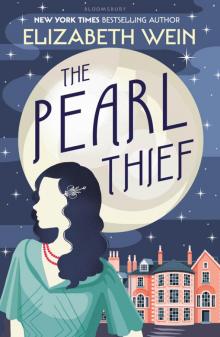 The Pearl Thief
The Pearl Thief Cobalt Squadron
Cobalt Squadron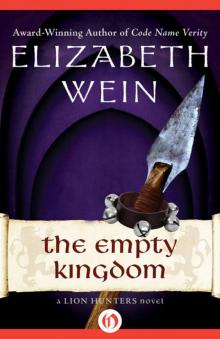 The Empty Kingdom
The Empty Kingdom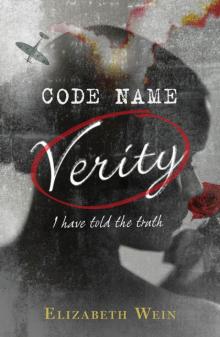 Code Name Verity
Code Name Verity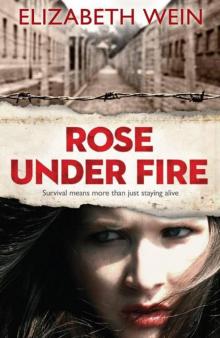 Rose Under Fire
Rose Under Fire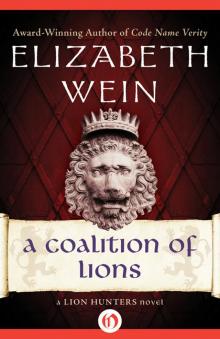 A Coalition of Lions
A Coalition of Lions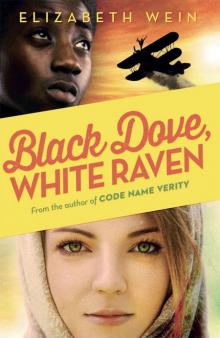 Black Dove, White Raven
Black Dove, White Raven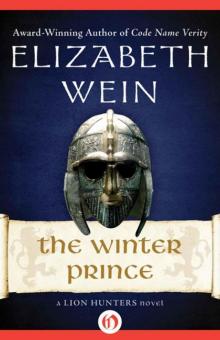 The Winter Prince
The Winter Prince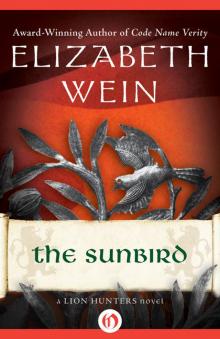 The Sunbird
The Sunbird